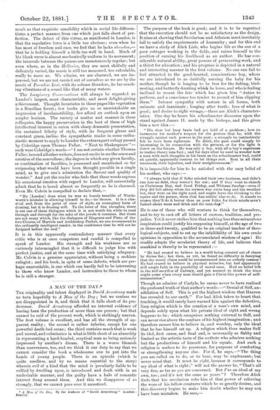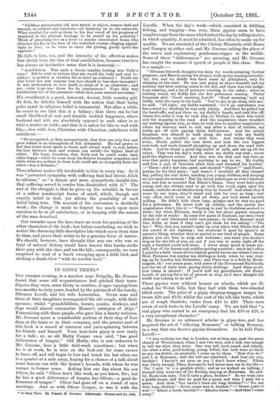A MAN OF THE DAY.*
Tax originality and talent displayed in David Armstrong made us turn hopefully to A Man of the Day ; but we confess we are disappointed in it, and think that it falls short of its pre- decessor. David Armstrong afforded no internal evidence of having been the production of more than one person ; but that cannot be said of the present work, which is strikingly uneven. The first volume is excellent, and has all the strength of ap- parent reality ; the second is rather inferior, except for one powerful death-bed scene ; the third contains much that is weak and unreal, and culminates in what is little short of an absurdity in representing a hard-headed, sceptical man as being seriously impressed by another's dream. There is a worse blemish than unevenness, too, and we think it our duty to say that we cannot consider the book a wholesome one to put into the hands of young people. There is an episode (which is quite needless, and by no means essential to the story) wherein evil of a kind that the mind is peculiarly liable to be sullied by dwelling upon, is introduced and dealt with in an undesirable manner, and the guilty have a halo of romantic interest flung around them. And this we disapprove of so strongly, that we cannot pass over it unnoticed.
• A Man of the Day. By the Authors of " David Armstrong." London Bentley.
The purpose of the book is good ; and it is to be regretted that the execution should not be as satisfactory as the design. It aims at showing that Secularism and Atheism must inevitably fail to satisfy the requirements of humanity ; and for this end we have a study of Alick Lisle, who begins life as the son of a poor cottager working in the fields, and raises himself to the position of earning his livelihood as an author. He has con- siderable natural ability, great powers of persevering work, and a thirst for education; and his progress is depicted in a natural and interesting manner in the first volume. No one can fail to feel attracted to the good-hearted, conscientious boy, whom we are introduced to as dutifully nursing the baby for his mother, though he is longing to be free for the fishing, bird- nesting, and butterfly-hunting which he loves, and who is feeling- inclined to resent the fate which has given him " duties to- perform, and a conscience too tender to permit of him slipping them." Intense sympathy with nature in all forms, both animate and inanimate ; longing after truth ; love of what is good ; and desire to right wrongs,—these are Alick's character- istics. One day he hears his schoolmaster discourse upon the stand against James II. made by the bishops, and this gives. him a new idea :-
" His slow but busy brain had got hold of a problem ; how to harmonise his mother's respect for the powers that be, with the struggle against such powers in the past ; a struggle be instinctively felt to have been righteous. To Alick, the past could simply be interesting in its connection with the present, or for the light ib threw on the future. He was only a boy, with all a boy's eagerness to realise theory into fact ; and for days after he used to wonder how a man with such thoughts in his brain as the schoolmaster had, could sit quietly, apparently content to let things rest. Rest in all their meanness, their injustice, and their nnrighteonsuess."
It is impossible for him to be satisfied with the easy belief of his mother, who says :—
" I always held that if folks minded their own business, and didn't- run into no debt, they weren't far out ; and if they went to church on Christmas Day, and Good Friday, and Whitman Sunday—even if they did fall asleep when the sermon was extra long and the weather hot, they were on the right road, and might leave the thinking to the squire and the parson, them that has nothin' else to do. It stands to reason they'll do it better than us poor folks, for their minds aren't fashed about meat and drink and the rent-day."
He is one of those who will venture to think for themselves, and to try to cast off all fetters of custom, tradition, and pre- judice. Yet it never strikes him that nothing less than miraculous inspiration could justify his supposing himself, at the age of two or three-and-twenty, qualified to be an original teacher of theo- logical subjects, and to set up the infallibility of his own crude opinions in opposition to the accumulated wisdom of ages ! He readily adopts the secularist theory of life, and believes that mankind is thereby to be regenerated :- " He had ceased to believe in a world being created out of chaos, by divine fiat ; but then, as yet, he found no difficulty in fancying that the moral chaos could be reconstructed into an orderly cosmos r- He had ceased to believe in physical miracles, but had apparently still ample faith in the possibility of moral ones. Had no belief left. in the self-sacrifice of Calvary, and yet seemed to think the time might come when every man should gain a Christ-like power of self-
renunciation."
Though an admirer of Carlyle, he seems never to have realised the profound truth of that author's words :—" Denial of Self, an- nihilation of Self. This is yet the highest wisdom that Heaven has revealed to our earth." For had Alick taken to heart that teaching, it would surely have warned him against the defective, limp religion which is the creation of a man's own mind, and depends solely upon what his private ideal of right and wrong happens to be ; which recognises nothing external to Self, and can never rise above the confines of his highest imagination; and therefore causes him to believe in, and worship, only the ideal that he has himself set up. A religion which thus makes Self its idol, first cause, and final end, is necessarily as flabby and limited as the artistic taste of the aesthete who admires nothing but the productions of himself and his equals. And such a religion is useless to its possessor, for purposes of comforting or strengthening anyone else. For if, he says,—" The thing you are called on to do, or to bear, may be unpleasant ; but never mind that. It must be right, because it corresponds to my ideal of what is right;" will not the answer be, "That's all very fine, as far as you are concerned. But rye an ideal of my own, too ; and it's not the same as yours " P Therefore Alick finds that his secularism robs him of that power of relieving the woes of his fellow-creatures which he so greatly desires, and this discovery begins to make him doubt whether he may not have been mistaken. He sees,— "Children prematurely old, men brutal or abject, women bold and sensual, or crushed and careworn—all hurrying on to the unknown. What comfort for such as these in his fine creed of the progress of mankind, in the glorious heritage to be stored up for posterity ? 'Think of preaching that as a lever to yonder intoxicated brute, who clenches his fist in the face of the wretched woman clinging appeal- ingly to him; as he turns to enter the glaring, gaudy spirit-bar opposite."
He falls in love, too, and the intensity of his affection makes him shrink from the idea of final annihilation, because true love has always an instinctive sense that it is immortal :-
- "Annihilation. Was such a theory tenable, looking into Nelly's eyes ? Did he wish to believe that she would die, body and soul to- gether ; so perfect a creation for so brief an existence ? Could one who loved her rest content that love should be less than immortal ? It was profanation to love itself, to think of it as otherwise ; and yet—what hope was there for its continuance ? None that was satisfactory out of her presence—while in it, none seemed necessary."
His sweetheart is a good, innocent, devout, little country girl. At first, he deludes himself with the notion that their being poles apart in religions belief is immaterial. But after a while, he comes to see that this is a fallacy ; that there can be but .small likelihood of real and durable wedded happiness, where husband and wife are absolutely opposed to each other in so vital a matter as faith ; and that it is safest for like to wed with like,—Jew with Jew, Christian with Christian, unbeliever with unbeliever :-
" He recognised, at first unconsciously, that love can only live and grow robust in an atmosphere of fall sympathy. He had grown to feel that heart must speak to heart, soul reveal itself to soul, before the love between man and woman can satisfy the higher ideal of -either. His hope, therefore, that Nell), and he could make each other happy—while he must keep his deepest thoughts unspoken, and while what was noblest in them both could ask no sympathy from the other—was a delusion."
Thus atheism makes life intolerable to him in every way. As it was "perverted sympathy with suffering that had driven Alick to atheism," so " a deeper and more sympathetic insight into that suffering served to render him dissatisfied with it." The -end of the straggle is that he gives up his unbelief, in favour of a rather nondescript frame of mind, which, though not exactly belief in God, yet allows the possibility of such belief being true. The account of his conversion is decidedly weak ; the change is made to depend too much upon mere emotion to be at all satisfactory, or in keeping with the nature of the man described.
Our remarks upon the hero leave no room for speaking of the other characters of the book ; but before concluding, we wish to notice the charming little descriptive bits which occur from time to time, and prove their writer to be a genuine lover of nature. We should, however, have thought that any one who was so fond of natural history would have known that hawks strike their prey with the claw, and not the bill ; consequently, we were surprised to read of a hawk swooping upon a little bird, and striking a death-blow " with its terrible beak."



































 Previous page
Previous page